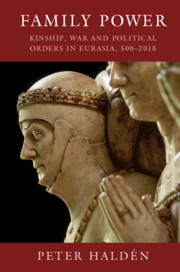Book contents
- Family Power
- Family Power
- Copyright page
- Contents
- Preface and Acknowledgements
- Chronology
- 1 Introduction
- 2 How Social Science Separated Families from Political Order
- 3 Formless Kinship in Formless Polities
- 4 Consolidating Dynasties and Realms
- 5 Strong Aristocracies in Strong States
- 6 The Revival and Sudden Death of Political Kinship
- 7 The Arab Empires c.632–c.900
- 8 Sacred Yet Supple
- 9 The Ubiquitous and Opaque Elites of the Ottoman Empire c.1300–c.1830
- 10 Clans and Dynasties in the Modern Middle East
- 11 Conclusions
- Bibliography
- Index
1 - Introduction
Published online by Cambridge University Press: 09 March 2020
- Family Power
- Family Power
- Copyright page
- Contents
- Preface and Acknowledgements
- Chronology
- 1 Introduction
- 2 How Social Science Separated Families from Political Order
- 3 Formless Kinship in Formless Polities
- 4 Consolidating Dynasties and Realms
- 5 Strong Aristocracies in Strong States
- 6 The Revival and Sudden Death of Political Kinship
- 7 The Arab Empires c.632–c.900
- 8 Sacred Yet Supple
- 9 The Ubiquitous and Opaque Elites of the Ottoman Empire c.1300–c.1830
- 10 Clans and Dynasties in the Modern Middle East
- 11 Conclusions
- Bibliography
- Index
Summary
This chapter presents the theories used in the empirical chapters. The book uses theories that emphasize that stable polities need consent and collaboration, not just coercion. Power is not only how the strong dominate the weak but also a function of how groups can work together and the institutions that help them integrate. Finally, I discuss how political order is more than just the sovereign state. Political order is a general category of order that does not presuppose a monopoly of violence but capabilities for warfare, a common identity and a way to act as a collective.
- Type
- Chapter
- Information
- Family PowerKinship, War and Political Orders in Eurasia, 500–2018, pp. 1 - 21Publisher: Cambridge University PressPrint publication year: 2020

